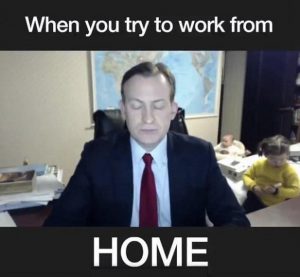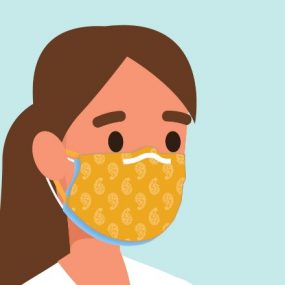Work From Home Struggles

Work plays a very big part of our livelihood and in fact, we spend roughly 90,000 hours of our lifetime at work. While many of us may grumble over the woes of having to sling the pills to pay the bills, this very workplace also provides us an escapism. For some, it’s the me-time away from their children and spouse; for others, it’s the friendships as co-workers’ bond (a.k.a membawang) over their ‘makan-makan’ sessions. With the Recovery Movement Control Order (RMCO) in place as of 10th of June, some pharmaceutical companies and higher education institutions have slowly allowed their employees to return to office in rotations and only if their physical presence is necessary. Although it may seem that we are easing ourselves back to normality, the battle against COVID-19 is far from over. Thus, many pharmacists in these sectors are still encouraged to work from home.
Working from home comes with many perks that one cannot deny – less time wasted on traffic, more time to catch up on sleep and the comfy clothes. The positives of WFH have been largely reported, however, the downsides of this practice have been sidelined. We fully understand that being able to WFH or let alone work in this economy itself is a privilege. Hence, we not here to gripe over the struggles of WFH because it is incomparable to the perils of being a frontline pharmacist and for that, we respect them. However, there is also a need to shed light on this area as the WFH initiative is probably going to stick around in the foreseeable future. In fact, many tech companies like Twitter has even exclaimed that employees can work from home ‘forever’. As technology continues to evolve and push boundaries, questions even raise as to whether would offices be obsolete one day?
From my WFH experience, I have come to learn that while I enjoy my time in my ‘sweats’, my home-cooked lunches and the extra 30 mins of sleep I get, there are some pearls which I certainly cannot refute. However, do not despair, I have prepared a few tips on what we could do during these trying times.
1) No amount of Zoom calls can replace in the flesh communication
Even though many of us come from a generation very well acquainted with virtual communication and the need to be ‘always on’, in-person social interactions are still very valuable in maintaining relationships and alleviating feelings of loneliness. For many who live on their own without their family, work relationships give sense of a belonging to a community. To top it off, new company recruits may find it especially hard to bond with work colleagues without the office lunches. While we are still able to use video conferencing solutions to host meetings and discuss over projects, it fails to convey the subtle nuances which hold values in building relationships. Furthermore, the gap widens as many of us opt to not turn on our videos in order to kononnya improve Internet connectivity and call quality (okay, guilty as charged, my hair was a total mess!).

Picture source: Reddit
Understandably, video conferencing may be our only option in this outbreak, and we would need to make do with it. This then falls back on the way we approach our conversations and discussions. Perhaps, before diving into the real-work talk, starting the conversation with a simple, “How have you been?” or turning on your video in small group meetings may help foster better relationships. You would be surprised that often with these small gestures, the social isolation that comes with these social distancing measures can be alleviated.
2) The Zoom fatigue is real
How many of you have realized that Zoom or Google Meet calls are more tiring than in-person communication? This probably sounds ironic considering you do not need to walk to another building and that your bottom has not moved from the chair since your last meal. This is because without the non-verbal cues that make up most of our conversations, we are forced to focus more intently to absorb the same amount of information. On top of that, there are often certain distractions that we have little control over – the grass cutter, our neighbour’s house renovation and a baby’s cry. These challenges are further compounded when one has no private space to work in.

The infamous BBC News Interview with Professor Robert as his adorable children joined in on the live broadcast
Picture Source: Aleteia
To combat the fatigue, try arranging breaks between your Zoom calls instead of doing a few back to back. This gives us a breather and helps us collect our thoughts for the next session. Try scheduling your meetings at times where the environment would be conducive for you– maybe it’s before your neighbour’s renovation starts or while your child takes their nap time. You have a say too!
3) Your working hours just fly by!
For one thing I have noticed is how fast my hours fly by and before I know it, it is the end of the day again. While on one spectrum, there may be more distractions at home; on the other, there are less work distractions like the monthly birthday cake cutting activities and festive makan-makans (as you can see this is my second time saying ‘makan-makan’ as the struggle is real). Thus, you fill that time with more work. The boundaries between work and personal life often becomes a blur as that physical boundary of work commute no longer exists. The risks for burn-outs are high during an outbreak.
Start by creating a routine and sticking to it schedule. When your day has come to an end, turn off the computer and step away from your desk. Sometimes after-hours work may be unavoidable if there are certain things which are needed urgently but do your best to stick to your routine. Perhaps this may be the most difficult to follow but try your best.
At the end of the day, while it is important to complete your work, it is just as important to safeguard your mental health. Work that you produce would not be of the highest quality if you were feeling burnt out and isolated from your colleagues. Continue to be kind to yourself and others. Perhaps, there’s a new PRP in your company or someone new just got transferred to your department? Drop them a message and do more than just say hello! It is the small gestures of kindness that make all the difference.
The opinions expressed in the article are the writer’s own and do not reflect the view of MPS YPC.
Picture Source: Pixabay













